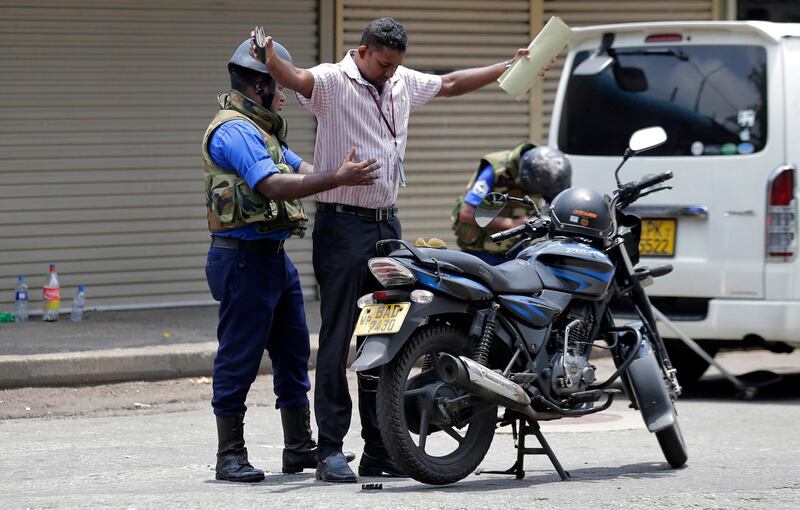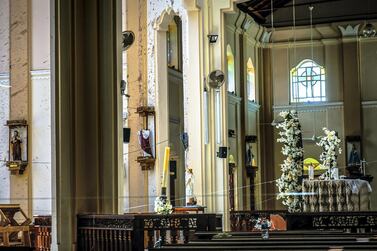Colombo, Sri Lanka’s jittery capital, was the scene of a major security operation on Thursday as fears over new attacks persisted following the Easter Sunday massacre that left at least 359 people dead.
Sri Lankan authorities locked down the central bank and the road leading to the capital's airport was shut briefly amid a bomb scare.
The search for members of the network that attacked three churches and four luxury hotels on Sunday is continuing as officials believe there are more individuals involved than the nine suicide bombers directly involved in the attacks.
Underscoring the nervous atmosphere in the Indian Ocean nation, authorities also shut the entry road to Colombo's main airport after a suspicious vehicle was identified at a nearby carpark. The road was reopened when the alert was declared a false alarm.
Businesses in Colombo are advised staff to stay indoors until 2pm local time because of a possible security threat and an ongoing search operation in the capital.
John Keells Holdings, the parent company of the Cinnamon Grand hotel, one of the sites stricken in the Easter Sunday bombings, sent an email to its staff on Thursday about the unspecified threat.
A police spokesman also said there was a so-far unexplained explosion in a town east of the capital but there were no casualties. It was not a controlled detonation like other blasts in recent days and was being investigated, he said.
More people, including foreigners, were swept up for questioning overnight as domestic and international authorities probed deeper into the bombings, which were the deadliest operation ever claimed by ISIS.
About 500 people were also wounded in the attacks.
Church leaders have told congregations not to gather for Mass until the security situation improves. Security has already been stepped up at churches across the country. The attacks came as churches were packed with worshippers attending Easter Sunday services.
Sri Lanka deployed thousands of troops overnight to help police search for suspects in the Easter suicide bomb attacks.
The government has acknowledged "major" lapses over its failure to prevent the horrific attacks despite receiving specific intelligence warnings.
Recriminations have flown since suicide bombers attacked Easter worshippers on Sunday. The president has asked the police chief and top defence ministry bureaucrat to step down, though neither has done so yet. Experts say a bitter political rivalry between the president and his premier may have contributed to the security lapse.
Overnight, security forces using newly granted powers under the country's state of emergency arrested 16 more suspects in connection with the attacks.
Brigadier Sumith Atapattu said the army had increased its deployment by 1,300 to 6,300 overnight, with the navy and airforce also deploying 2,000 more personnel.
Authorities also announced a ban on drone flights and suspended licences issued to commercial operators with immediate effect.
The government has been on the defensive over revelations that specific warnings about an attack went ignored.
Sri Lanka's police chief warned on April 11 that suicide bombings against "prominent churches" by the local Islamist group National Tawheed Jamaat (NTJ) were possible, citing information from a foreign intelligence agency.
President Maithripala Sirisena, who is also defence and law and order minister, pledged Tuesday to make "major changes in the leadership of the security forces in the next 24 hours".
On Thursday, he will meet with the country's political parties to discuss the crisis, and later with religious leaders as concerns rise about a potential backlash against Sri Lanka's Muslim minority.
Investigators are still piecing information together about the attack and those involved, with deputy defence minister Ruwan Wijewardene revealing Wednesday that one attacker had studied in Britain and did post-graduate studies in Australia before returning to Sri Lanka.
"Most of them are well-educated and come from middle, upper-middle class families, so they are financially quite independent and their families are quite stable financially, that is a worrying factor in this," the minister added.






